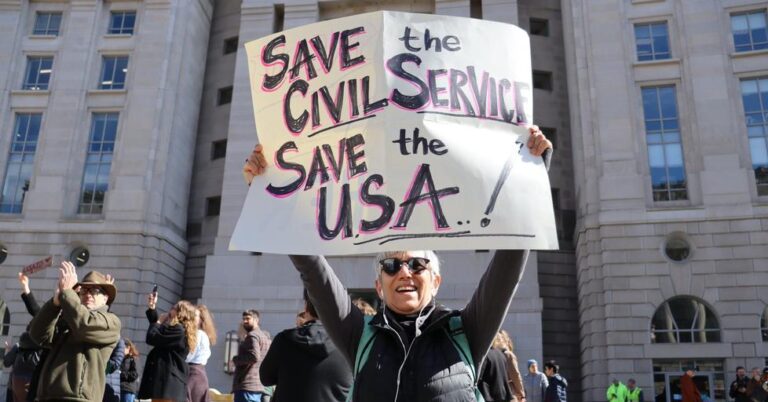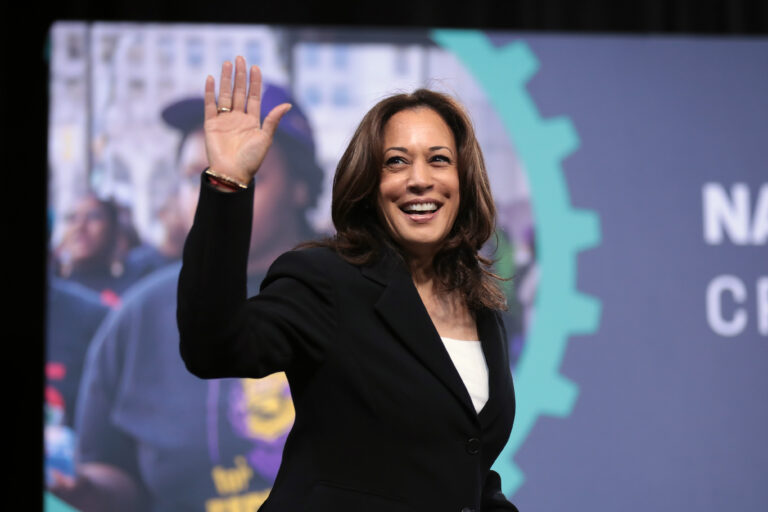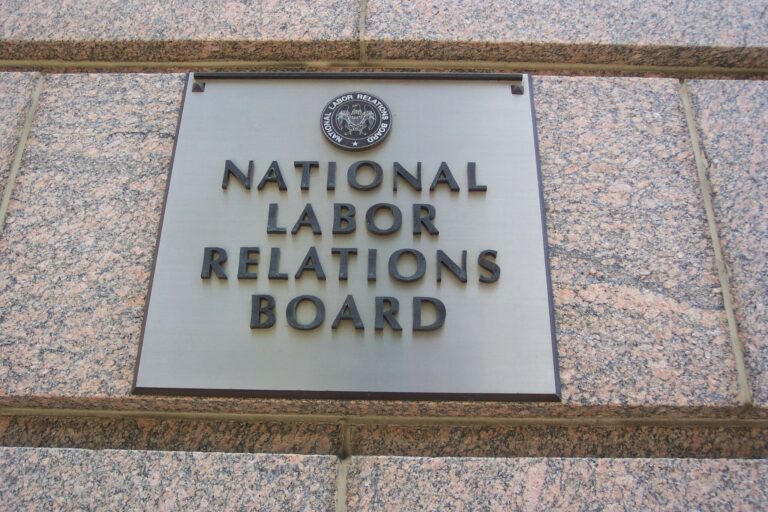Since President Trump took office, public participation in mass forms of civic participation has increased dramatically. The Women’s March, in Washington, D.C. and sister cities across the country, was the largest march in U.S. history. Thousands gathered at airports to protest the Muslim Ban. Activism generated more protests, like “A Day Without Immigrants,” “A Day Without Women,” and to come, a March for Science. But what role can employees working for the federal government have in speaking out? Mounting public pressure against employees highlights the need to educate public employees on their rights to engage in civic discussion and protect their interest in political speech.
A Park Ranger Started the Movement
The first display of public employee participation in civic discussion around Trump administration actions and policies began on January 20th, when the National Park Service (NPS) retweeted a side-by-side comparison of 2009 and 2017 inauguration crowds. The NPS later deleted the retweet and spokesman Thomas Crosson apologized for “mistaken RT’s.” In the first week of his presidency, President Trump instructed the Environmental Protection Agency (EPA) and the Interior Department, which oversees the NPS, to cease communicating through social media. But on January 24th, the Badlands National Park, tweeted a series of climate change data, including “Burning one gallon of gasoline puts nearly 20 lbs of carbon dioxide into our atmosphere. #climate.” By nightfall, the posts were deleted and a NPS official said that the posts were improperly posted by a former employee.
Later that evening, rogue employees fought back. An “AltUSNatParkService” Twitter account tweeted, “You can take our official twitter, but you’ll never take our free time!”

This tweet galvanized the resistance to President Trump’s gag orders. Cartoons, like the one below, emerged everywhere.
 By the next day, January 25th, @AltNatParkSer had 477,000 followers.
By the next day, January 25th, @AltNatParkSer had 477,000 followers.
Though social media can serve as a platform for employees to speak out in free time, the protection that “free time” provides employees is not absolute. The NPS employees declined to identify themselves, fearing reprisals. Their original posts had used the NPS’s official logo, and linked to the official website.
On January 25th, the rangers tweeted:

Then, on January 28th, the group officially changed its logo and its name to @NotAltWorld. It handed off the reins to other activists and journalists. In particular, they tweeted “This account was started by a few guys … who wanted to shout when the big boss wanted people to be silent.” “It got a bit much for them (and us!) Seriously folks, you wouldn’t believe how hard it is to understand the reaction to a cry of resistance.”
Rangers admitted that threats came on Twitter and rumors started at their jobs; employees feared they would be identified and reported to their superiors at work. Ultimately, they handed the account over, so the park service would stop any “digging on its own employees.” The stress from public employers trying to figure out the park rangers’ identities, coupled with public scrutiny about revealing their identities, pressured the rangers to drop their activism a mere 4 days after they started a movement.
Recently, the Department of Homeland Security directed Twitter to reveal the identities behind @ALT_uscis, another twitter account run by federal employees that criticized the President’s immigration and enforcement policies. This demand further exacerbates the pressure that employees face against their rights to speak out. Twitter filed a lawsuit to block the order, arguing that the government’s directive was unlawful and that complying would have a chilling effect on speech concerning public political life. Twitter dropped its suit after the government withdrew its demand.
Further public backlash may have pushed public employees to express their dissent through other channels. When over 1,000 State Department employees signed onto a dissent cable protesting the Muslim Ban, White House Press Secretary Sean Spicer lashed out, saying “career bureaucrats,” should “either get with the program or … go.” EPA employees, fearful for their jobs, turned to encrypted messaging to discuss saving scientific data and how to voice their dissent. But Republican congressmen demanded EPA to investigate what they believed were EPA employees’ circumvention of federal record-keeping requirements. An organization has even filed a FOIA request for these records from the EPA.
The Legal Landscape
Protections for free speech for government employees exist, but are complex and fragmented. The Supreme Court has stated that an individual entering government service “by necessity must accept certain limitations on his or her freedom.” The Hatch Act specifically prohibits federal employees, as well as state, D.C., and local government employees who work in connection with federally funded programs from engaging in political activities while on duty or in the workplace. The Office of Special Counsel has issued guidance explaining that since President Trump has filed paperwork with the Federal Election Commission establishing his candidacy for the 2020 Presidential election, federal employees may not advocate for or against his 2020 campaign. They may, however, express opinions, on or off duty, about his 2016 Administration and policies.
While the Hatch Act creates duties based on an on and off duty distinction, not all off duty communication is protected. Public employees still only have 1st Amendment free speech rights when they speak on matters as private citizens. Specifically, this means speaking on a matter of public concern, not pursuant to their duties, and in a way that would not substantially cause, or be perceived to cause, disruption in the government workplace. The Supreme Court has also said that bright line distinctions, like whether speech occurred in the office or concerned the subject matter of employment, are not dispositive. As an example, the EPA Office of General Counsel sent out a memo stating, “to participate in individual personal capacity, we urge you not to use your EPA email address …. If you feel you must refer to your EPA position…then the prudential advice is to do so as one of several biographical details with EPA not having any undue prominence.”
The Whistleblower Protection Act also protects federal civil service employees from retaliation for their speech. But the act offers protection only when an employee discloses something she reasonably believed was illegal, like abuse of authority, gross mismanagement, or substantial and specific danger to public safety.
The Role of the Advocate
Some lawyers have recognized the need to lessen the burden on individual employees to figure out the law, and have come forward and offered their services free of charge. The ACLU similarly offered their services to the anonymous @ALT_uscis Twitter user. In addition to representation of individual employees, however, advocates must educate public employees to ensure they understand the law and do not get overwhelmed. In February, 180 federal employees signed up for a workshop on workers’ rights and civil disobedience. The recently launched Resistance School has created online practical skills for “Taking Back America” and reached over 15,000 viewers during its first training. These trainings should clarify federal laws as well as the patchwork of state laws regulating public employee speech. Doing so will ease the burden public employees bear when weighing whether to participate, and is essential to encouraging the civic dialogue necessary for a vibrant democracy.










Daily News & Commentary
Start your day with our roundup of the latest labor developments. See all
January 18
Met Museum workers unionize; a new report reveals a $0.76 average tip for gig workers in NYC; and U.S. workers receive the smallest share of capital since 1947.
January 16
The NLRB publishes its first decision since regaining a quorum; Minneapolis labor unions call for a general strike in response to the ICE killing of Renee Good; federal workers rally in DC to show support for the Protecting America’s Workforce Act.
January 15
New investigation into the Secretary of Labor; New Jersey bill to protect child content creators; NIOSH reinstates hundreds of employees.
January 14
The Supreme Court will not review its opt-in test in ADEA cases in an age discrimination and federal wage law violation case; the Fifth Circuit rules that a jury will determine whether Enterprise Products unfairly terminated a Black truck driver; and an employee at Berry Global Inc. will receive a trial after being fired for requesting medical leave for a disability-related injury.
January 13
15,000 New York City nurses go on strike; First Circuit rules against ferry employees challenging a COVID-19 vaccine mandate; New York lawmakers propose amendments to Trapped at Work Act.
January 12
Changes to EEOC voting procedures; workers tell SCOTUS to pass on collective action cases; Mamdani's plans for NYC wages.